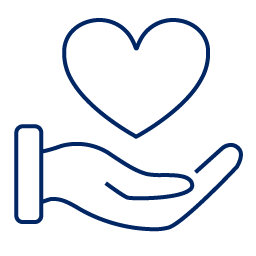Priority 3: Optimal cancer treatment, care and support

Deliver safe, high-quality, accessible and sustainable cancer treatment, care and supports to all
Our actions for the next five years
| # | Action |
|---|---|
|
3.1 |
Support best-practice and value-based cancer care to ensure people are seen at the right time, in the right place, for the right care. |
|
3.2 |
Provide care that is coordinated, easy to access and navigate, is given by multidisciplinary teams (teams of cancer specialists with expertise in different areas of cancer care) and is affordable for the person being treated. |
|
3.3 |
Ensure people who experience cancer, their families and carers are actively linked with supportive care and services such as psychosocial care, allied health care and financial counselling. |
|
3.4 |
Provide patients, families and carers with timely access to relevant, credible and understandable information that helps them to play an active and informed role in making decisions about their treatment and care. |
|
3.5 |
Improve integration and communication across services and providers, between local health districts (LHDs) and specialty networks (SNs) and across the public, private and primary care settings. |
|
3.6 |
Ensure high quality and accurate information is available to those working in the health system to support them to make decisions and develop quality improvement initiatives that are informed by the best available evidence. |
|
3.7 |
Ensure that feedback from patients about their experiences and outcomes is routinely used for care delivery, service planning and quality improvement. |
Quality cancer treatment means ensuring that people living with cancer receive comprehensive assessment, treatment and care overseen by a multidisciplinary team of cancer and allied health specialists, and safe, high-quality and person-centred treatment at all stages of the cancer care pathway, including survivorship and palliative care.
There are many forms of treatment, used alone or in combination to treat cancer. The best treatment for individuals depends on a variety of factors including:
- type of cancer
- stage and grade of cancer
- the patient’s overall health
- the patient’s choices and preferences.
Effective cancer support also includes allied health, psychosocial support, palliative care, non-clinical support, fertility services, support for cancer survivors, and support for families and carers.
An important part of delivering the best cancer treatment, care and support is collecting and responding to patient input, feedback and advice at all stages (planning, implementation, review and evaluation). Strong evidence links patient experience and person-centred care to improved clinical effectiveness, patient safety, healthy behaviours and better patient outcomes.9
“I feel so fortunate to have this multidisciplinary team around me who support and coordinate my care. But even with this team things fall through the cracks. You have to be a self advocate and remind them, ‘oh I’ve had this scan’ or ‘these were my results last time’. Often communication between doctors and between hospitals isn’t great.”
Putting the principles into practice
Examples may include:

For equity of outcomes, continuing to expand access to culturally safe and responsive supportive care and services, for example through ensuring diversity in recruitment practices and cultural competency training for cancer care staff.

For person-centredness, co-designing patient feedback systems with people who experience cancer, their families and carers to capture what matters most to them.

For collaboration, strengthening links between all providers of cancer treatment, care and support so that people who experience cancer, their families and carers have a seamless experience.
“It would be nice if the whole process was a little bit more clear, or a little easier to understand. I remember after my diagnosis someone gave me a list of 20 or so specialists and told me to pick one … that’s not very helpful. At the beginning, you’re really just going through the motions and it’s frightening and confusing.”

What success looks like
For the health system
People affected by cancer, their families and carers receive safe, high-quality and seamless cancer treatment, care and support that meets all their needs.
For people at risk of or affected by cancer, their families, and carers
Once I am diagnosed with cancer, I quickly start treatment and I receive the most appropriate treatment.
It is easy for me to access all the services that I need. This includes cancer treatment, but also things such as allied health, psychosocial support and non- clinical support like financial counselling advice.
There is good communication between everyone involved in my care. I don’t have to repeat my story each time I see someone.
